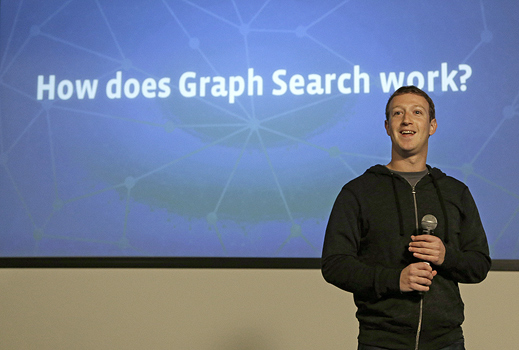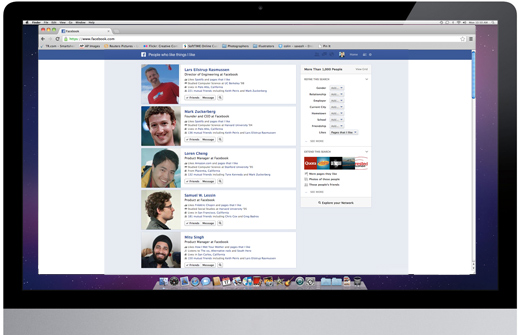Facebook’s New Graph Search: Not Very Good
For years, we’ve been shoveling data into Facebook’s maws by way of status updates, photo uploads, comments, “likes,” and check-ins. Until this week, though, there has never been a way to really sift through any of that data.

Graph Search, unveiled on Tuesday and currently available to only a smidgen of Facebook’s billion users, lets you use natural-language queries to track down all kinds of things from your social network.
I’ve had some time to test it out, and I believe it has huge potential. I don’t see it taking the place of Google, but I can imagine a future where we turn to Facebook first to find restaurants, potential dates, and job hookups—a terrifying prospect for sites like Yelp, LinkedIn, and Match.com (see Facebook’s “Graph Search Won’t Hurt Google Without Your Help”).
But there is a long, long (long) way to go before Graph Search gets to that point. It might be useful to those who “like” and check in at lots of places on Facebook, but that behavior hasn’t really caught on within my tiny social circle, which means that, for me, at least, Graph Search isn’t very good.
At first I felt excited when I approached the revamped search bar, trying to figure out what the heck I should search for. Facebook seems to have anticipated that users might feel overwhelmed by choice. The bar itself says “Search for people, places, and things,” and clicking on it yields a list of suggested choices—perhaps, it implored, I wanted to search for photos of my friends, nearby restaurants, or photos I have liked.
I tried a few simple searches, such as “Restaurants my family liked” and “Chinese restaurants my friends who live in San Francisco, California, like.” The former led to a short list including, surprisingly, a Sizzler in Albany, California, that my older brother apparently enjoys. The latter had only three entries (I got many more when I tried “Chinese restaurants my friends who live in San Francisco, California, have been to,” but this wouldn’t necessarily mean they also enjoyed these places). A search for “friends who like football” brought up only one person, which wouldn’t make for much of a Super Bowl party.
Some queries were much more successful. I’ve been thinking of getting together some local women who like cycling, so I decided to search for “My female friends of friends who live in San Francisco, California, and like biking.” Jackpot: this brought in over 100 potential riders.
Searching for photos I have liked was a nice trip down memory lane, surfacing some images I don’t even remember seeing the first time. It was also neat to be able to search photos in a very specific way—I could look up photos of my boyfriend that I “liked” in a certain year—which might be useful for people who catalog years’ worth of images on the site.
It was also kind of cool to search through historical photos that people have made publicly available on the site. Searches for photos taken in San Francisco and New York before 1950 brought up some cool old images of life in these cities.
I did like the layout of results. Searching for movies my friends like produced a small image for each movie, the names of a couple of friends (and total number of my friends) that like it, how many people on Facebook like it overall, and other movies these people like. A little “Like” button makes it easier for you to add your approval of a movie, too, and a tiny magnifying glass gives you the option of seeing a long list of people who liked the movie as well as photos that people have posted that are related to the movie in some way—such as shots of themselves dressed up as the Dude from The Big Lebowski.

Graph Search results are accompanied by a sidebar on the right side of the page that lets you refine or extend any search. And the integration with Microsoft’s Bing search engine is well done. If, for instance, you search for nail salons in New York, you’ll get a little Bing map that lets you zoom in on any result in the list. You can change the type of place you’re looking for, define who you want to have “liked” it, or where it should be located.
But the results themselves were mainly disappointing. Usually, there weren’t that many—if any—results for specific queries involving my friends (I got only two results with one “like” apiece for the query “Nail salons in San Francisco, California, that my friends like,” for example).
And the results were sometimes glitchy, reflecting the difficulty of processing natural language queries. For example, I tried searching for “My friends who like Mitt Romney” and got two people who genuinely seem to like him, along with a third who likes a page called “Mitt Romney is an Asshole.” And several times when my searches were for people who live in a specific city, Graph Search produced people who are from that city but actually live elsewhere (a search for “Single women who live in San Francisco, California, and like Videodrome and beer”—something I figured a guy might want—yielded one result, but she actually lives in Seattle).
I understand the value in getting Graph Search out as soon as possible—the more people that are using it, the better it can get—but that means its first iteration is disappointing. For it to be really useful, Facebook will have to figure out how to mine status updates and comments, and bring in data from the Open Graph. Undoubtedly, we’ll also have to buy into it by “liking” more, checking-in more, adding more details to our profiles, and meticulously tagging photos.
The connection between Facebook “likes” and real-world sentiment also goes only so far. I felt suspicious about the value of results I did get. Many results were liked or checked-in at by just a few friends who tend to indulge in that behavior. How did I know that my friends really, truly liked these places? Perhaps they were lured into pressing the “like” button to get a freebie. And maybe my brother just “likes” that Sizzler in an ironic, hipster way.
Keep Reading
Most Popular
Large language models can do jaw-dropping things. But nobody knows exactly why.
And that's a problem. Figuring it out is one of the biggest scientific puzzles of our time and a crucial step towards controlling more powerful future models.
How scientists traced a mysterious covid case back to six toilets
When wastewater surveillance turns into a hunt for a single infected individual, the ethics get tricky.
The problem with plug-in hybrids? Their drivers.
Plug-in hybrids are often sold as a transition to EVs, but new data from Europe shows we’re still underestimating the emissions they produce.
Stay connected
Get the latest updates from
MIT Technology Review
Discover special offers, top stories, upcoming events, and more.